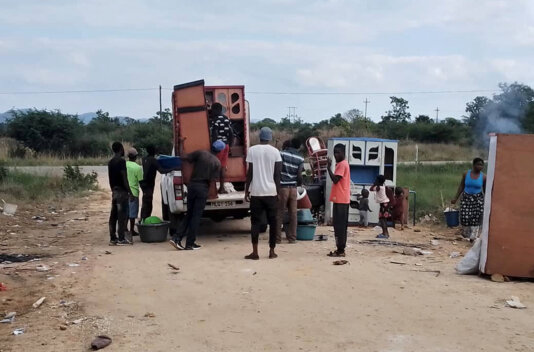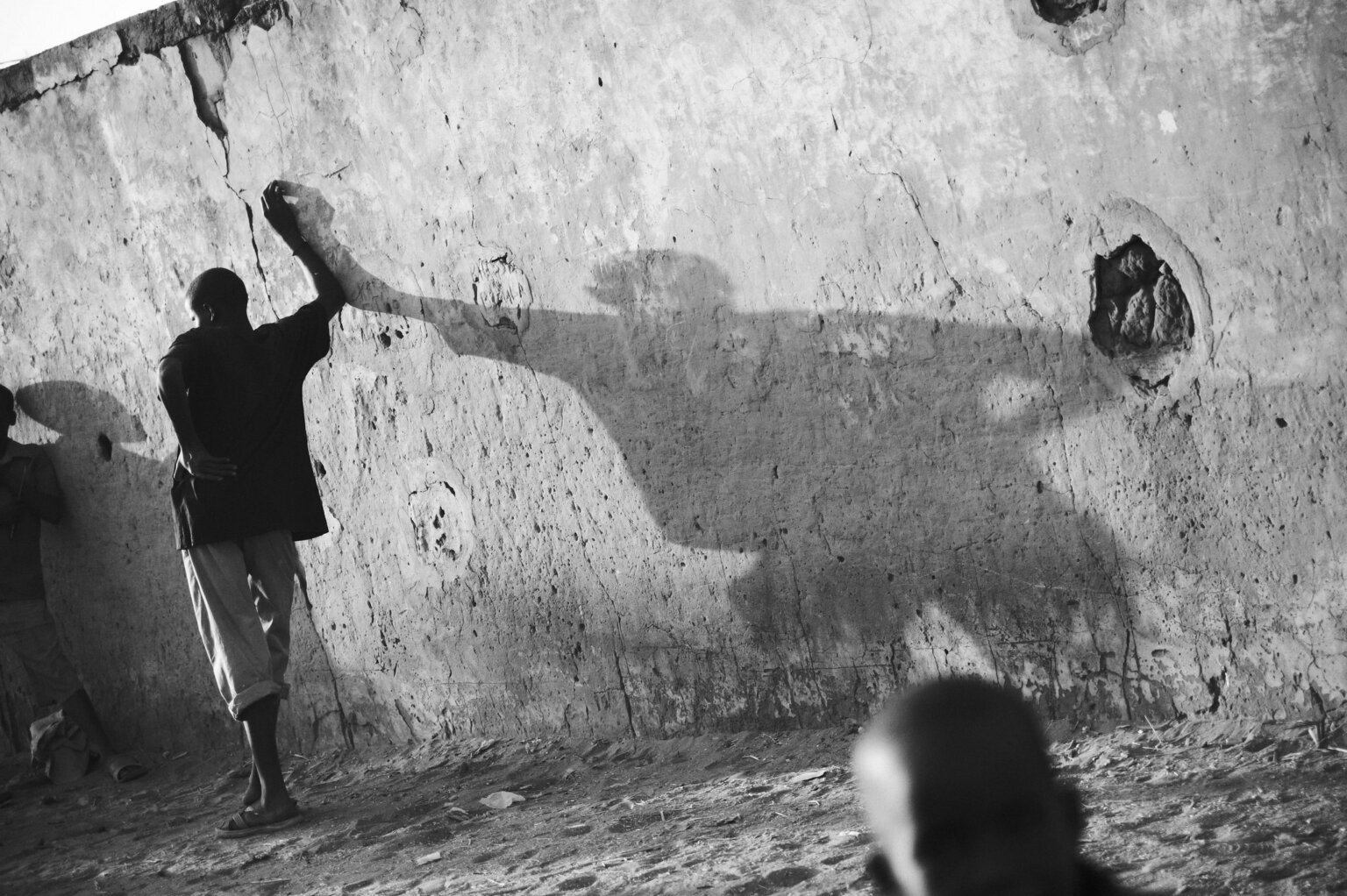- About
- Topics
- Picks
- Audio
- Story
- In-Depth
- Opinion
- News
- Donate
-
Signup for our newsletterOur Editors' Best Picks.Send
Read, Debate: Engage.
| June 20, 2022 | |
|---|---|
| topic: | Political violence |
| tags: | #mining, #Zimbabwe, #IDPs, #Mining Induced Displacements |
| located: | Zimbabwe |
| by: | Cyril Zenda |
In late April, unnamed "new owners" of Ran Mine, a defunct gold mine some 100 km northeast of Zimbabwe’s capital, Harare, gave 500 families of its former workers a 48-hour notice to vacate the mine compound that most of them had called home their entire lives.
When the ultimatum expired, earth-moving equipment moved in to raze the dilapidated houses. The occupants and their belongings were bundled into trucks - in drizzling rain - and dumped by a roadside several kilometres away. With cold winter just kicking in, each family unit had to find its own way to somewhere… or nowhere.
This is merely the latest case in Zimbabwe’s growing trend of mining-induced displacements (MID) that the mineral-rich southern African nation is becoming increasingly notorious for.
With the government ambitiously aiming to attain a $12 billion dollar mining industry by next year, for the past few years, tens of thousands of people have been uprooted from their homes to make way for mining ventures with very little or no regard to their rights. This has prompted a coalition of 23 non-governmental organisations to petition the government to end these human rights abuses.
"In Zimbabwe, mining companies often fail to pay adequate and prompt compensation, give people adequate notice and follow due process before relocation, and to provide proper relocation facilities and services before relocation," noted an NGO coalition dubbed Publish What You Pay (PWYP) Zimbabwe. PWYP seeks to bring accountability and transparency to the country’s murky extractives sector.
"In the process they violate a litany of procedural and substantive environmental, social, economic and cultural rights. This is partly because residents of communal areas do not own the land and have no title over it. Title is vested in the State and this makes them vulnerable. While the Constitution prohibits forced evictions without a court order, many people are evicted from their homes without the required court order."
MIDs are becoming more prevalent as a result of increased allocation of mining rights in areas of rural households, the NGOs argue, giving the example of the Marange community, where 4,321 families were displaced.
The coalition also pointed to the relocation of 1,068 families by Rio Tinto’s Murowa Diamond Mine and the continued apprehension of some families in the Sese area, where the same diamond miner has been awarded an exploration license.
"There is a high possibility of displacement of communities in Hwange as a result of coal mining and in Murehwa, Mutoko and Uzumba as a result of granite mining," stated the coalition. "Many communities where diamond exploration activities are taking place are apprehensive, including Rimbi in Chipinge and Sese in Masvingo."
"Besides mining induced displacements, a number of DIDR (Development Induced Displacements and Resettlements) threats or notices have been issued against a number of communities to make large-scale agricultural projects and infrastructure development," it went on. "These include Chilonga in Chiredzi (growing lucerne grass), Chisumbanje (growing sugarcane for ethanol production) and Dinde. In the case of Chisumbanje, the land displacements have resulted in a series of human rights violations as well as conflict between investors and the community members."
In its petition, the coalition gave several conditions that it said should be fully met whenever a mining displacement cannot be avoided. These include full consultation with the affected communities to obtain their unreserved consent; inclusive, independent and consultative assessments; relocation with prompt, fair and adequate compensation; protection of communities from abusive practices by the mining firms; resource sharing; and adherence to international standards on displacements.
"The urgency to build a $12 billion mining economy has come at a price," concluded a report by the Centre for Natural Resources Governance (CNRG) - a local natural resources watchdog - after carrying out a fact-finding mission on the mass eviction of the 500 families at Ran Mine.
"Human rights and environmental degradation are being overlooked and are fast becoming endemic in the scheme of things," the report further states. "It is incumbent upon progressive stakeholders in the extractives industries to hold mining outfits to account for their actions in all manner of their interaction with the environment, host communities and acquittal of requisite dividends to the taxman."
In 2019, the centre estimated that mining projects were going to displace at least 30,000 people within five years as mining firms stampede to exploit the country’s mineral resources.
CNRG director Farai Maguwu told FairPlanet that there is tremendous opaqueness in the extractives sector, including the fronting of shadowy 'foreign investors' to facilitate these displacements.
"A new trend has emerged in Zimbabwe where the ruling party officials are grabbing mines and engaging rich Asian individuals to come and partner them," said Maguwu. "They abuse the courts and police to attack local residents and claim there is a new investor who wants to start operations. Last year, a similar incident happened at C Mine in Mberengwa, where several houses were razed to the ground after a court order had been obtained by the so-called new investor.
"But what does the Constitution of Zimbabwe say about house demolitions and evictions?"
Section 74 of the Constitution says, 'No person may be evicted from their home or have their home demolished without an order of the court made after considering all the relevant circumstances.'
Maguwu said that in cases of possible displacements, 'relevant circumstances' must also include the welfare of the persons to be evicted.
"Where do they go? Is there alternative land or accommodation for them? What about the right of children, women, the elderly, the sick, disabled and all affected?" asked Maguwu.
"The Constitution and our laws also protect us from judges who may misdirect themselves into granting nefarious Court Orders without considering the rights of the victims," he added. "Thus an order of the court that leaves people destitute is ultra vires the constitution. It is criminal to throw thousands of human into the open, more so at the beginning of winter. It is a pity no one is challenging these odoriferous court orders that throw hundreds of families into the open just to please one or two greedy individuals."
The Zimbabwe Environmental Lawyers Association (ZELA), a rights advocacy group, recently commissioned a study to investigate the suitability of the laws that relate to land rights in Zimbabwe in the face of MIDs. Also subject to this probe was the efficacy of these laws in mitigating the effects of mining induced displacements.
"The findings of the study confirm that there is need to have the law developed for it to be more responsive to the needs of the communities affected by displacements," said the investigation’s report, which was published on 31 May this year.
"The amendments or changes to the law should prioritise interventions relating to security of tenure, community participation, a framework for the relocation of communities affected by mining operations, transparency, and accountability in the sector," the report further states.
Mines and Mining Development minister Winston Chitando did not respond to questions from FairPlanet, while the Speaker of Parliament Jacob Mudenda has in the past acknowledged the urgency of passing on-going amendments to the country’s mining laws.
"The amendments to the Mines and Minerals Act have opened another opportunity for us to reflect and ponder on what can be domesticated in the interest of our citizens and the country at large," Mudenda said.
Image by EC/ECHO/Aminata Diagne Barre.
By copying the embed code below, you agree to adhere to our republishing guidelines.

